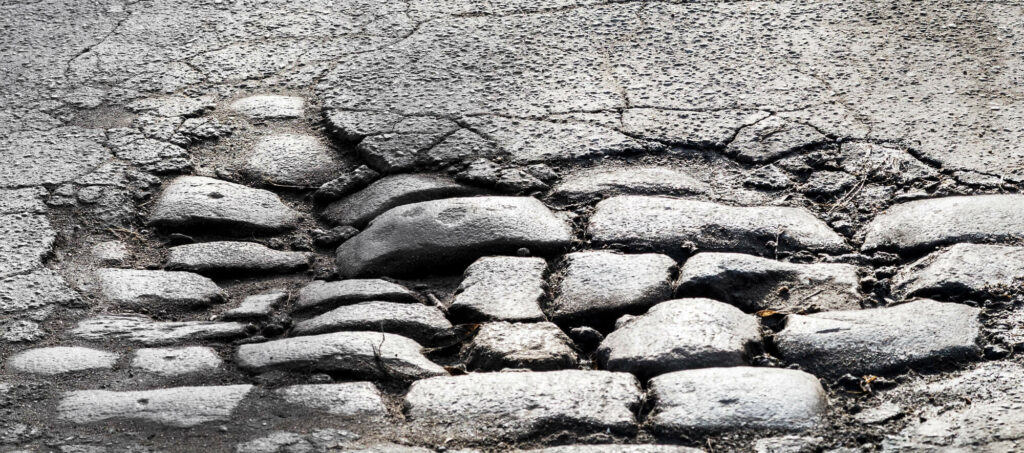Next time you’re walking down the main street in your town, take a look at some of the commercial buildings. You’ll likely notice that each one has some sort of paved structure; a shop’s parking lot, a shaded restaurant patio, fast-food drive-thrus, or a loading dock at a warehouse can all constitute commercial pavement.
Asphalt and concrete are durable materials most often used by commercial paving companies. We’ve created a comprehensive guide to help commercial business owners understand and maintain their commercial asphalt or concrete pavement. Whether you’re wondering what material to choose or how to care for existing pavement, our ultimate guide to commercial paving has you (and your business) covered.
What Constitutes Commercial Pavement?
Commercial pavement can be many different things; it’s not difficult to spot some commercially paved structures around your local area. Examples of locations where you’ll easily find commercial pavement include:
- Malls and shopping centers
- Grocery stores
- Parking lots (shopping centers, auto dealerships, college campuses, etc.)
- Parking garages
- Churches
- Drive-thrus (fast-food and banks)
- Libraries
- Government facilities
- Shipping terminals
- Warehouses and manufacturing facilities
- Office parks
- Restaurants and bars
Commercial pavement typically consists of asphalt or concrete materials. Find an experienced commercial pavement contractor to find the exact solution to enable your commercial business to function at the highest efficiency.
The Best Commercial Paving Materials
Paving the surface of a parking lot or other commercial structures can seem challenging. However, when working with the right commercial paving company, you can quickly and easily find a suitable solution for your property. Most commercial property owners opt for asphalt or concrete paving materials for the ease of installation and impressive lifespan.
Asphalt vs. Blacktop: What’s the Difference?
People with everyday jobs outside of the construction industry often confuse asphalt and blacktop for the same material. The terms are not interchangeable; in fact, they are entirely unique substances. It is an easy mistake to make, but there are some crucial differences between the two types of paving materials.
While both asphalt and blacktop require high heat levels to meld the material’s ingredients together, there are stark contrasts that make asphalt better for commercial purposes.
Asphalt
The most commonly used commercial paving material is asphalt, a durable material made from crushed stone and bitumen. Bitumen is often found in asphalt roof shingles as well and is a viscous material that holds the rocks together.
Blacktop
Blacktop is best suited for side streets, driveways, cul-de-sacs, and other residential paved surfaces. Blacktop has a significantly higher amount of stone in its composition, so it must heat to a higher temperature than asphalt to adhere to the mixture’s lower bitumen level.
Why Asphalt?
Overall, asphalt is the best option for commercial roadways, parking lots, and other structures. Your local paving contractor will probably recommend using commercial asphalt instead of blacktop because the material offers numerous advantages to property owners, including:
- Asphalt reduces noise from the traffic driving over it, making it an excellent option for businesses on busy roads.
- The downtime after asphalt installation is short. Freshly poured asphalt only takes two days to drive on again. Depending on the technique used, you can travel on top of asphalt almost immediately following a repair.
- Asphalt is durable and flexible, requiring fewer repairs over time.
- Asphalt’s dark color melts and helps snow and ice from standing stagnant on the pavement’s surface, making it a great choice for colder climates.
Asphalt pavement is an affordable commercial paving option because it’s easy to install and maintain throughout the year. Even with heavy vehicle or pedestrian traffic and exposure to the elements every day, asphalt withstands weathering significantly better than blacktop. Asphalt repairs are quick and straightforward, so your commercial location can stay open for business during regular upkeep without bothering customers or employees.
Commercial Concrete
When installed at an adequate thickness, concrete is another reliable commercial paving choice. Concrete is a durable material; however, it’s not recommended for colder climates since concrete is less effective than asphalt at melting snow and ice. Concrete slabs are made from sand and other smaller rocks, so the light colors do not absorb heat in the same manner as asphalt materials. Some commercial businesses prefer concrete because it’s completely customizable with a wide array of colors, patterns, stampings, and designs to choose from to stand out from the local competition.

Caring for Commercial Pavement
When you think of asphalt and concrete, you probably imagine a virtually indestructible material. While it’s true that these materials can withstand tons (literally, tons) of weathering and vehicle traffic, they still require regular maintenance to prolong the lifespan of the pavement.
Signs of Pavement Damage
Although asphalt and concrete are incredibly durable materials, they must withstand enormous amounts of weathering and other impacts from damaging agents throughout the year. If you notice any of the following signs of pavement damage, it’s probably best to call an experienced paving company in your area for repairs:
- Potholes
- Networks of cracks
- Alligator cracks
- Block cracks
- Uneven surfaces
- Faded lines and stripes
- Pooling water
Obvious problems like potholes and fading paint can damage vehicles and pose a danger to pedestrians. The last thing you need is to be held liable for someone’s injury or auto accident. Act quickly to perform repairs, especially in heavily trafficked commercial parking lots and garages, to avoid costly legal issues.
The Right Time To Repaint Your Parking Lot
Commercial parking structures are under immense pressure at all times. From cars or buses to busy pedestrians, parking lots can take a lot of traffic. Unfortunately, over time, any lot will likely need repainting of its lines. Forgoing a fresh striping regularly can cause severe problems in your parking lot.
Most commercial paving contractors recommend re-striping annually, especially if your parking lot is heavily traveled. Areas that are less frequented can hold off on re-striping for up to 18 months. When lines fade, it can lead to hazards fender benders and cars parked carelessly. It’s crucial to check your parking lot striping each year to ensure that the lines are visible so people can park safely. Re-stripe your lot right away if you notice any of the following issues:
- Faded or discolored lines
- Damaged wheel stops
- Lack of handicap spot visibility
- Increased accidents or fender benders
- Cars parked against the design of the parking lot
- Traffic flow disruptions
All of the issues mentioned above indicate that it’s time to re-stripe your parking lot. Even the most stringent regime of preventive maintenance can’t stop paint from fading. Perform an annual check to see when to schedule your re-striping.
Preventative Pavement Maintenance
Aside from striping, there are other important preventive maintenance measures necessary to protect paved surfaces. Performing proper year-round maintenance and repairs on commercial pavement can add years to its lifespan and leave more money in your wallet in the long run.
Cleaning Commercial Pavement
It’s difficult to discern damage when your pavement’s surface is dirty. Simply sweeping away dirt, dust, and debris enables you to see cracks, faded paint, and other issues so you can repair them right away.
Dealing With Cracks
Don’t let small cracks turn into extensive systems that can destroy the surface of your pavement. Two types of crack networks called block or alligator cracks can turn perfectly good pavement into a total mess. Check the surface for damage regularly and repair fractures as soon as they occur.
Fixing Potholes
Potholes are a huge hazard in parking lots for vehicles, pedestrians, and property owners. If you don’t deal with potholes right away, it can result in damage to cars or danger to traveling pedestrians. Avoid a massive headache and fill in potholes right away using infrared asphalt repair or other pavement repair techniques.
Infrared Asphalt Repair
Infrared asphalt repair, otherwise known as IRR, is an excellent solution for potholes and other pavement problems. The cost and time-saving solutions allow for seamless repairs and fewer traffic disruptions by quickly heating and combining the existing asphalt with new materials. It requires minimal manual resources and uses recycled asphalt, so it’s environmentally friendly, too. The method leaves asphalt flexible yet strong, making it the perfect pavement repair solution for freezing Minnesota winters.
Sealing the Surface
Use an appropriate asphalt sealant every few years to prevent weathering from outside elements. Adequate sealing every 2-3 years preclude the need for premature repairs and repaving.
Re-striping
Re-striping parking spot paint is an essential part of parking lot maintenance. Refusal to re-stripe your commercial parking lot or garage each year results in increased fender benders and other traffic violations. Avoid accidents and other issues by re-striping your faded lot lines annually.
Choosing a Commercial Paving Partner
If you want to guarantee your commercial paving installation or repairs go smoothly, it requires a little research. Comparing paving contractors can save you time, money and leave you with a lasting relationship with a trusted local paving professional. There are a few crucial steps to take during your search when seeking out a commercial paving partner. Here are some suggestions on starting your selection for a new commercial paving candidate:
- Using reputable resources like neighboring businesses or an online directory such as Angie’s List, examine paving companies’ reviews in your area. When comparing multiple contractors, don’t be afraid to ask questions like:
- Who are you?
- Is your company insured?
- How much will this cost?
- Do you have the experience to complete this installation or repair correctly?
- Can I see a portfolio of completed projects and testimonials?
- Does your state or local government have specific paving regulations in place? If so, ensure your contractor is certified with the correct credentials. Ask about industry-specific memberships and certifications as well.
- Look for companies that include the cost of equipment and project materials in the final quote, so you’re not blindsided by unexpected expenses at the conclusion of your commercial paving project.
Choosing a paving partner to work with your commercial company can seem challenging. However, when you find the perfect fit, you begin building a strong relationship with a local company who will have your back whenever repairs are required.
Conclusion
Asphalt and concrete are both excellent commercial paving materials that can add curb appeal and value to your business property. With the proper preventative maintenance and care throughout the year, commercial pavement can last through an impressively long lifespan. Find a favorable commercial paving company in your area to assist with installation, repairs, and maintenance. As soon as you notice issues arising, contact your preferred paving partner to fix them quickly so your customers can continue to utilize a beautiful and functional commercial parking lot or other paved surfaces.




